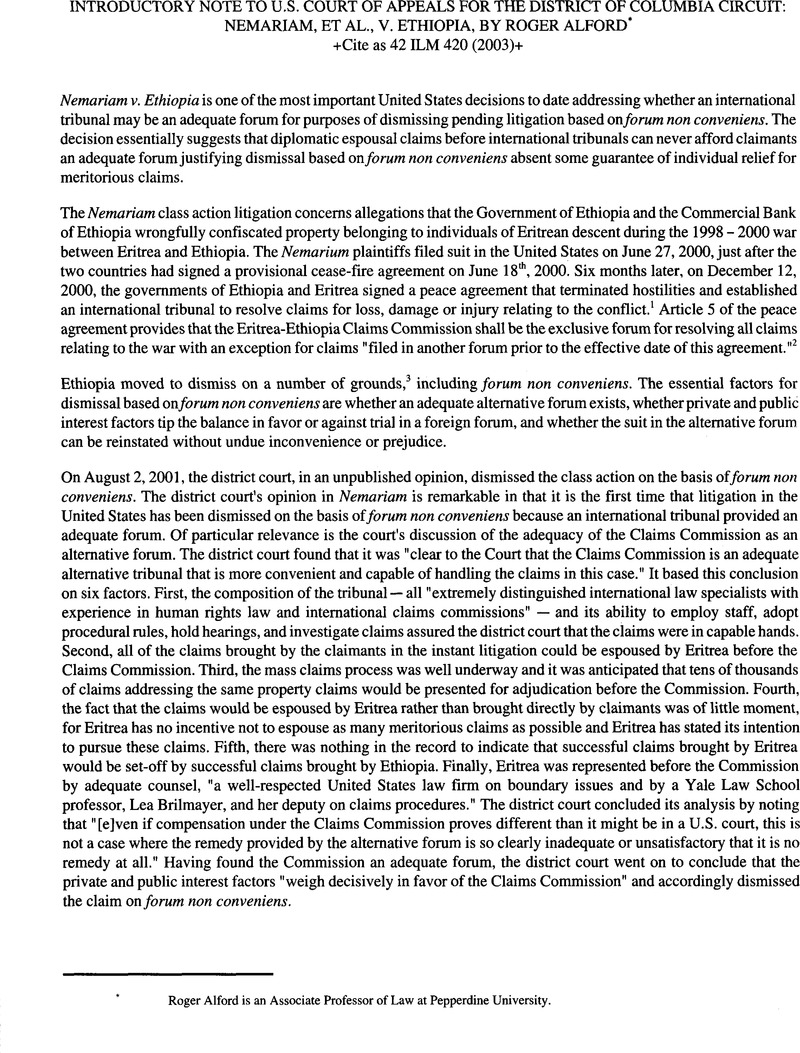Published online by Cambridge University Press: 27 February 2017

1 See Agreement Between the Government of the Federal Democratic Republic of Ethiopia and the Government of the State of Eritrea (Peace Agreement), 40 I.L.M. 260 (2001).
2 See art. 5, § 8 (“Claims shall be submitted to the Commission by each of the parties on its own behalf and on behalf of its nationals…. Except for claims submitted to another mutually agreed settlement mechanism in accordance with paragraph 16 or filed in another forum prior to the effective date of this agreement, the Commission shall be the sole forum for adjudicating claims described in paragraph 1 or filed under paragraph 9 of this Article, and any such claims which could have been and were not submitted by that deadline shall be extinguished, in accordance with international law.“).
3 These include the act of state doctrine, sovereign immunity, lack of personal jurisdiction, forum non conveniens and abstention.
4 Restatement (Third) of Foreign Relations Law, § 902 (1987).
5 In re Union Carbide Corp. Gas Plant Disaster at Bhopal 634 F.Supp. 842, 852 (S.D.N.Y. (1986); In re Union Carbide Corp. Gas Plant Disaster at Bhopal 809 F.2d 195, 205 (2d Cir. 1987).
6 Dames & Moore v. Regan 453 U.S. 654, 679-80 (1981).
7 La Abra Silver Mining Co. v. United States 175 U.S. 423, 463 (1899) (“We might well doubt the soundness of any conclusion that could be regarded as weakening … the force that should be attached to the finality of an award made by an international tribunal of arbitration. So far from the act of Congress [preventing disbursement to La Abra of funds paid by Mexico] having any result of that character, the effect of such legislation is to strengthen the principle that an award by a tribunal acting under the joint authority of two countries is conclusive between the governments concerned, and must be executed in good faith unless there be ground to impeach the integrity of the tribunal itself.“); see also Frelinghuysen v. United States ex rel. Key 110 U.S. 63, 73 (1884); United States ex rel. Boynton v. Blaine 139 U.S. 306, 322 (1891).
8 See, e.g., Banco Nacional de Cuba v. Sabbatino 376 U.S. 398, 423 (1964) (act of state doctrine “expresses the strong sense of the Judicial Branch that its engagement in the task of passing on the validity of foreign acts of state may hinder rather than further this country's pursuit of goals both for itself and for the community of nations as a whole in the international sphere.“).
9 See, e.g., Bi v. Union Carbide Chemical and Plastics Co., 984 F.2d 582 (2d Cir. 1993) (“To grant the victims of the Bhopal disaster… access to our courts when India has set up what it believes to be the most effective method of dealing with a difficulty problem would frustrate India's efforts[W]ere we to pass on the validity of India's response to a disaster that occurred within its borders, it would disrupt our relations with the country and frustrate the efforts of the international community to develop methods to deal with problems of this magnitude in the future.“)